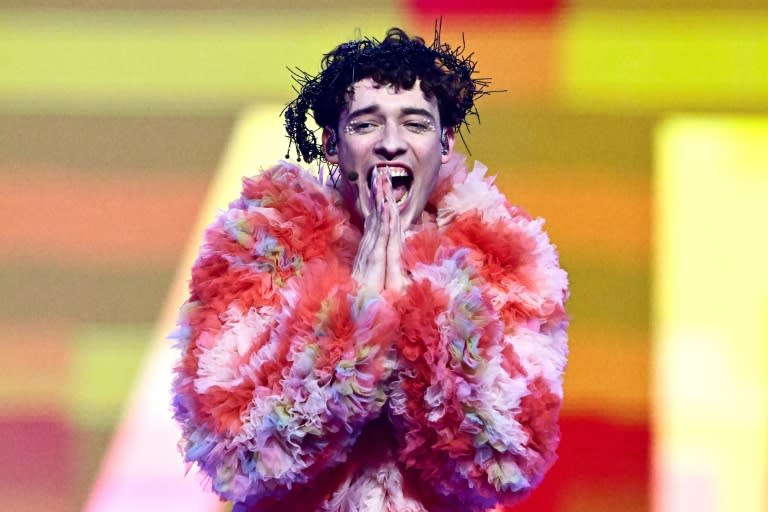Gender breakthrough in Swiss triumph at politically-charged Eurovision contest

- Oops!Something went wrong.Please try again later.
Switzerland promised a joyous celebration Sunday for Nemo, the first non-binary performer to win the Eurovision Song Contest at the end of one of the most politically-charged competitions ever.
"The Code", a song about the 24-year-old Nemo's discovery of a non-binary gender, garnered backing from national juries and popular votes to triumph in the annual pan-European contest of kitsch.
Croatian Baby Lasagne came second, while Ukrainian duo Alyona Alyona were third.
French singer Slimane took fourth place while Israel's Eden Golan, who had been the target of protests over Israel's actions in the Gaza war, finished fifth.
"I hope this contest can live up to its promise and continue to stand for peace and dignity for every person in this world," a teary-eyed Nemo said while receiving the trophy in the early hours of Sunday.
"'The Code' is about the journey I started with the realisation that I am neither a man nor a woman," said Nemo.
The singer, who identifies as non-binary and uses the pronoun "they", dedicated their win to the "entire LGBTQIA+ community".
People in their home city of Biel danced in the streets when the result was announced on a giant screen where they had watched the contest held in the Swedish city of Malmo.
"We look forward to celebrating your victory soon in Biel at an official public reception," city authorities said in a declaration on X, the former Twitter.
Yves Schifferle, head of the Swiss delegation at the contest, said Nemo put on a "sensational performance" after having to "withstand the enormous pressure they have been under for weeks."
- Controveries -
The contest of 25 nations -- which draws a global television audience of more than 100 million -- was one of the most controversial ever.
Golan was the target of protests over the Gaza war and the Dutch competitor Joost Klein was disqualified over an incident with a camerawoman.
The incident had involved Klein making a "threatening movement" after he was filmed directly after coming off stage "against clearly made agreements," Dutch broadcaster AVROTROS said.
Thousands of people took part in protests in Malmo against Israel's participation in the contest because of its actions in Gaza.
When Golan went on stage with her long lavender-streaked hair and matching nails to perform "Hurricane", cheers and boos could be heard from the 9,000 audience in the Malmo Arena.
Boos could also be heard when Israel's jury delivered its points to other acts and any time a country gave "Hurricane" high scores.
Golan, along with the singers from Croatia and Ukraine, had been among the pre-show favourites. Fans watching in Israel said the scoring was dominated by diplomacy.
"We didn't get much from the countries. That's obviously a political thing," said Tal Shur, manager of a bar in Tel Aviv, that showed the Eurovision contest.
An Israeli victory would have meant that "maybe we are not hated so much, and that the music really won", said Tal Bendersky, draped in an Israeli flag, before the results were announced.
Some Croatians also felt hard done by as Baby Lasagna's song "Rim Tim Tagi Dim" scored highest in the public vote, in which Golan was second.
"It has been shown that the weight of politics has again been conclusive in the Eurovision contest," said Nina Plese, 34, who was among several hundred to watch the contest on a screen in the centre of the Croatian capital Zagreb.
- Eurovision 'needs fixing' -
Organisers banned all flags other than those of the participating countries, but Nemo sneaked in an emblem representing non-binary people and displayed it during the show's introduction.
"I had to smuggle my flag in," the winner told a press conference after the win, adding that "maybe Eurovision needs a little bit of fixing."
The young performer also said that the experience had been "really intense and not just pleasant all the way."
"There were a lot of things that didn't seem like it was all about love and unity and that made me really sad," Nemo told reporters.
Outside the arena, police pushed back protesters where more than 100 demonstrators waved flags and chanted "Free Palestine".
Malmo is home to Sweden's largest community of Palestinian origin and according to police at least 5,000 people gathered in the afternoon.
cbw/jll/tw/cw/rox

